
You Are Never Too Young to Be Your Own Boss
Does being a newly-called lawyer always entail being at the bottom of the food chain? Perhaps not. We speak to five individuals (both practitioners and non-practitioners) who have assumed leadership positions at a relatively young age. They prove that age is not always a barrier to blazing your own trail.
Wilbur Lim, Joint Managing Director, WMH Law Corporation
Wilbur graduated from the Singapore Management University School of Law in 2011 with Summa Cum Laude and commenced practice at a Singapore Big Four law firm.
In 2016, Wilbur started his own firm, WMH Law Corporation, where he is now the joint managing director. In 2017, Wilbur was selected to be on Asia’s “40 under 40 lawyers” list published by Asian Legal Business (ALB) and was shortlisted as a finalist for the prestigious ALB’s South East Asia Young Lawyer of the Year Award. The law firm now comprises five lawyers.
Why did you decide to start your own firm?
My partners and I are very passionate about the law. We have our views on how practice should be like, in light of the prevailing socio-economic climate. As young lawyers, we have many ideas on how we could utilise our knowledge and skills in the law to benefit the greatest number of people. We wish to customize our practice and have a say in legal fees, so as to make legal representation more accessible to businesses and individuals alike.
Were there unanticipated challenges you encountered in starting your own firm?
We have made extensive preparations prior to commencing our own practice. I am glad to say that we have anticipated most, if not all, challenges in starting our own firm. Mark Lee, Hazell Ng, and I had drawn out very detailed plans on what we have to achieve at different milestones.
When we first started out, we did encounter opposing counsel making baseless remarks about us. My partners and I generally let our work speak for themselves, rather than being overly defensive.
Within a year, our firm and our lawyers have been nominated in a number of regional awards for our work. True enough, such remarks have ceased almost completely.
How is running your own firm different from being a salaried lawyer in a larger firm?
Being a salaried lawyer is all about hitting the billables. Running your own firm is an amalgamation of bringing in the billables and to set clear directions on how to develop your practice to greater heights. Rather than worry about whether I have clocked enough hours for the day, my objective is to ensure that my associates are able to hit their billables for the next few months.
Do you have any advice for young lawyers aspiring to start their own firms?
Think about the reasons why you wish to start your own firm. You also need to have a clear goal in mind. It is not an easy journey.
If your intention is to run away from your obligations as an employee, chances are that you will not be able to handle the transition to being an employer at your own firm.
If you are questioning whether you should step out of your comfort zone into the unknown, you are not ready yet.
If you have just won your first application as a first year associate and think that you are ready to take on the world, be humble, learn the ropes, and respect your mentor. I am very fortunate to have had wonderful mentors at an early stage of my career. Find the right mentor, and it will go a long way towards your goal.

Wilbur Lim, Joint Managing Director, WMH Law Corporation

Management team of WMH Law Corporation
Chan Yuk Lun, Founder, SingaporeLegalAdvice.com
Before it became Singapore’s everyday legal platform, SingaporeLegalAdvice.com began as a blog that Yuk Lun started while in law school. After graduating from the Singapore Management University in 2014, he decided to work on it full-time. SingaporeLegalAdvice.com has since grown from strength to strength with two full-time staff and a small tech team based overseas. Today, it is a platform where individuals and businesses can get legal information and obtain fee quotations from lawyers, among other services. The website generates revenue from helping lawyers market themselves.
Why did you decide to start your own business after graduating from law school, instead of taking the usual route of getting called to the Bar first?
It was an easy decision for me after graduating from law school because I knew that there was a chance I could make the legal platform work if I spent more time on it. It is not that I knew for certain that I didn’t like practising law. It was more of carrying on and following through with an idea that I believed in.
What do you find most challenging and rewarding about running SingaporeLegalAdvice.com?
What is challenging, especially when starting out, is that we do not know what exactly to do next. There are always so many options, but only so much you can do. There is no roadmap, no instruction manual and no one telling you what to do. So I have to figure things out on my own as I go along, and seek guidance from time to time.
The journey itself is a reward. SingaporeLegalAdvice.com was just a blurry vision I had when I was in law school. Seeing it materialize and grow is very rewarding. From just a trickle of visitors at the start, today, we have around 170k visitors to the site per month. When I see the positive impact that it’s making, on both lawyers and the public, it’s very satisfying.
Do you have any regrets about not practising law?
No, it has been very rewarding to grow the business from an idea that began in law school. Instead of drafting contracts and preparing arguments, I work on things like sales, marketing and product development. I can never be sure that this path is better, they are simply different things. As some doors close, other doors open. It helps that I enjoy meeting creatives and entrepreneurs from other fields and industries, whom I might not have met otherwise. And ironically, I doubt I would ever have gotten featured in the Law Gazette if I were practising law!
What next for SingaporeLegalAdvice.com?
The landscape for legal services has changed a lot since I first started, and we have to constantly innovate our marketing methods and products. Currently, we’re working on a new feature of the platform directed at end-users. Follow us on Facebook or Instagram @singaporelegaladvice to keep up with the latest updates!
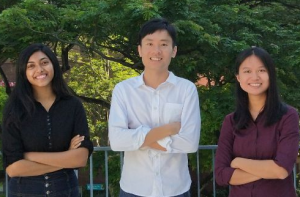
Chan Yuk Lun (centre) with his team at SingaporeLegalAdvice.com
Mahesh Rai, Director, Drew & Napier LLC
Mahesh obtained an LLB from the National University of Singapore in 2008 and an LLM from the University College London in 2009. He began practice at Drew & Napier LLC in 2010 and rose swiftly through the ranks. He was made an equity director earlier this year at the age of 34 – one of the youngest to have achieved this.
Mahesh acts for clients in a broad spectrum of litigation and international arbitration matters. Apart from being called to the Singapore Bar, Mahesh is an Attorney-at-law of the state of New York, a Solicitor of England & Wales and an International Lawyer of Cambodia.
How is being an equity director/partner different?
For starters, you have many more matters to handle and heavier responsibility. A lot more time has to be spent on managing your practice.
You are also responsible for the people working for you. The ability to manage people is important and not the same approach works with everyone. You must know how to motivate your team members effectively and encourage them to give their best.
You also must make sure that the people working for you feel part of a team. I have found that when the going is heavy, people appreciate it when you roll up your sleeves and help to ease the load.
People also appreciate it when you take the time to teach and help them develop their careers. For example, coaching junior lawyers for their first contested matter goes a long way. Taking an interest in their personal development as individuals also shows that you care.
What qualities must one possess in order to rise through the ranks in a top firm?
First, you must have the right attitude and always be willing to learn. No one can know everything and you should never stop learning. Also, always be open to challenging yourself and stepping out of your comfort zone. This way, you will avoid stagnating.
Second, you must be able to ride with the times. When there are lull periods, learn to take a breather and recharge. When work gets intense, you must learn to cope with the pressure. It is not easy but we all get better with time.
Third, you must have tenacity. It is so important for a lawyer to be tenacious in representing his or her clients, upholding justice and being determined to succeed.
Do you have advice for young lawyers aspiring to succeed in a law firm?
In your early years, absorb as much as you can from those around you. There will be difficult times, so always try to keep your chin up and never give up. You must actively look out for opportunities to grow personally and professionally. No one owes you a career so you are the driver of your own destiny.
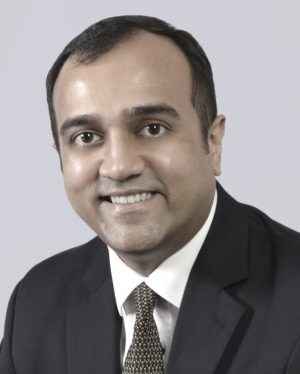
Mahesh Rai, Director, Drew & Napier LLC
Marcus Li, General Counsel and Co-founder, Slate Alt
Marcus is the General Counsel and part of the founding team of Slate Alt, an investment and capital raising firm that focuses on deep technologies. He is also a Director at Hello Tomorrow Singapore, the regional hub of the global non-profit Hello Tomorrow which promotes and facilitates deep-tech development globally. Marcus graduated from the Singapore Management University School of Law in 2014 and practised insolvency and corporate restructuring law for a year prior to developing Slate Alt and Hello Tomorrow Singapore.
Could you tell us more about your firm and your role?
Slate Alt was the brainchild of various discussions my friends and I had. We were convinced that deep-tech development was vital to the betterment of humankind, but as an asset class, was underfunded and poorly understood. As such, we created Slate Alt to accelerate the growth of such technologies by bringing together industry experts, motivated investors and forward-thinking innovators.
While I oversee the legal and compliance aspects of the firm’s operations, and provide legal perspective in formulating business strategies, I do have to handle multiple roles, as is typical in any high-growth organisation. I also work on business development and source for new collaborations.
What do you find is the biggest difference between your experience in the practice of law and your current role?
I think the biggest difference is how the roles require me to view circumstances with different lenses. In legal practice, my focus was on identifying and finding solutions to legal problems.
In contrast, my current roles additionally require me to actively find exciting untapped possibilities and opportunities, and turn them into reality. For example, Hello Tomorrow Singapore was a just conceptualisation of our team in the middle of last year, but has now started to establish its bona fides as the reference deep-tech platform in Southeast Asia, after being launched with Minister S Iswaran alongside numerous government partners at the Viva Tech Conference in Paris earlier this year. We will even be hosting South-East Asia’s largest challenge for deep-tech start-ups in November this year!
Did your time in private practice prepare you for the challenges in the business world?
Yes definitely. For starters, legal and transactional experience certainly helps in any negotiation and risk assessment. But more than this, the intangibles I have learnt from my mentors and those developed in practice have helped me immensely – commercial sense, decisiveness, meticulousness, resourcefulness, determination, focus, and grit.
Do you have any advice for young lawyers aspiring to start their own businesses?
You need to make very objective assessments – does my business have a strong value proposition? Is there a need for my services? Will my services be easily displaced? Does my team have the ability to make the business a success? Is the fight to overcome obstacles worth the time and effort?
Unless you find yourself convinced and clear on these questions, you should take a step back and rethink. Speak to people who can mentor you and get second opinions. If you do decide to take the plunge, be realistic, but always be optimistic and flexible.
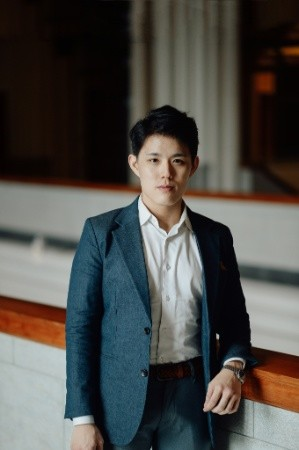
Marcus Li, General Counsel and Co-founder, Slate Alt
Choo Zheng Xi, Director, Peter Low & Choo LLC
Zheng Xi graduated from the National University of Singapore in 2010, and joined Peter Low LLC in 2012. In 2016, Zheng Xi became the first Singaporean to clinch the International Bar Association’s (IBA) Outstanding Young Lawyer of the Year Award at the age of 30. That year, Zheng Xi also became a named Director of Peter Low & Choo LLC.
What do you find the most challenging about being a “name partner”?
Constantly reminding myself to be a good role model for my colleagues, and reminding myself that I’m directly responsible for building the firm’s goodwill and “bringing home the bacon”. Every day, I feel the pressure of making sure I live up to the expectations of my colleagues, and I strive to be a better person and a better lawyer to make sure everyone can say they’re proud to be a stakeholder of the firm.
Do you think that young lawyers are at a disadvantage when it comes to business development?
I prefer to think about the opportunities.
Being a young lawyer has its advantages. Everyone likes the feeling of being able to help someone, and early on in practice I had many older clients who had given me work to give me a leg up. A lot of senior lawyers were very generous with their time and wisdom, and helped me build my practice. None more so than my mentor and partner, Peter Low. You just need to be humble, sincere, and put yourself out there.
I remember my first time being invited to an embassy event: it was terrifying. Standing in the middle of the Ritz Carlton ballroom all by myself, and screwing up my courage to walk up to people at the buffet line to make small-talk. But I quickly realised that the ballroom was full of people like me: slightly lost, pretty intimidated, and relieved to meet someone else who was pro-actively talking to them.
Do you have any advice for young lawyers aspiring to build their profiles in the legal industry?
Be hungry: never say no to work. When you’re young, and your hourly rates are inexpensive, that’s the best time to try out every and any type of work.
Never, ever, look down on anyone because of their station in life and always be willing to use your legal skills to help others. Ethically, it’s the right thing to do: it’s an important principle of the Legal Professional (Professional Conduct) Rules that “a legal practitioner must facilitate the access of members of the public to justice”. But in the long run, it also makes very sound business sense: helping people builds goodwill. And goodwill will bring you more and better work.
Finally, although I’m not religious, I draw inspiration from this prayer by St Thomas More, the Catholic patron saint of lawyers:
“Lord, grant that I may be able in argument,
Accurate in analysis, strict in study,
Candid with clients and honest with adversaries.
Sit with me at my desk and listen with me
To my Client’s plaints, read with me in my library,
And stand beside me in Court, so that today I shall not,
In order to win a point, lose my soul”.
Keep this with you in your practice of the law, and I hope it illuminates your path as it has mine.
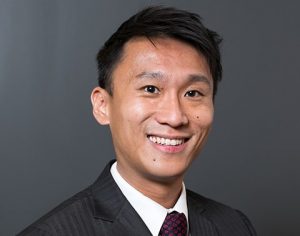
Choo Zheng Xi, Director, Peter Low & Choo LLC
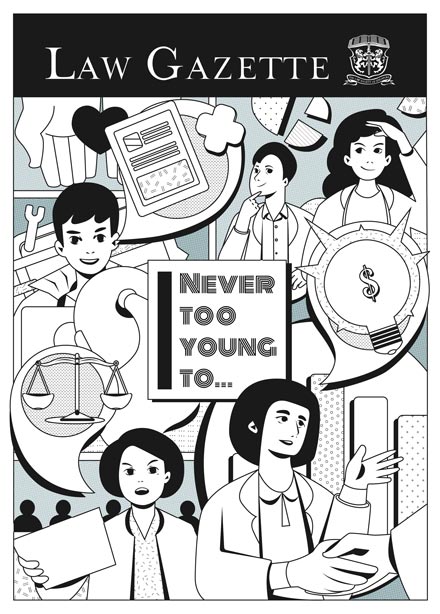
This article is part of the August 2018 Special Issue produced for the newly called lawyers of Mass Call 2018.






